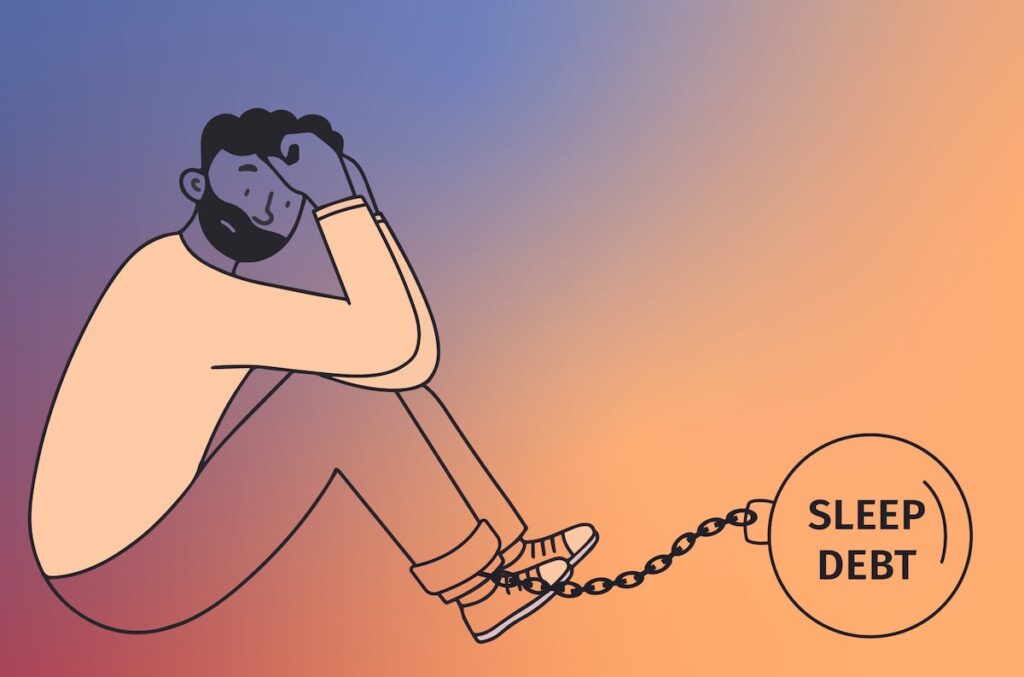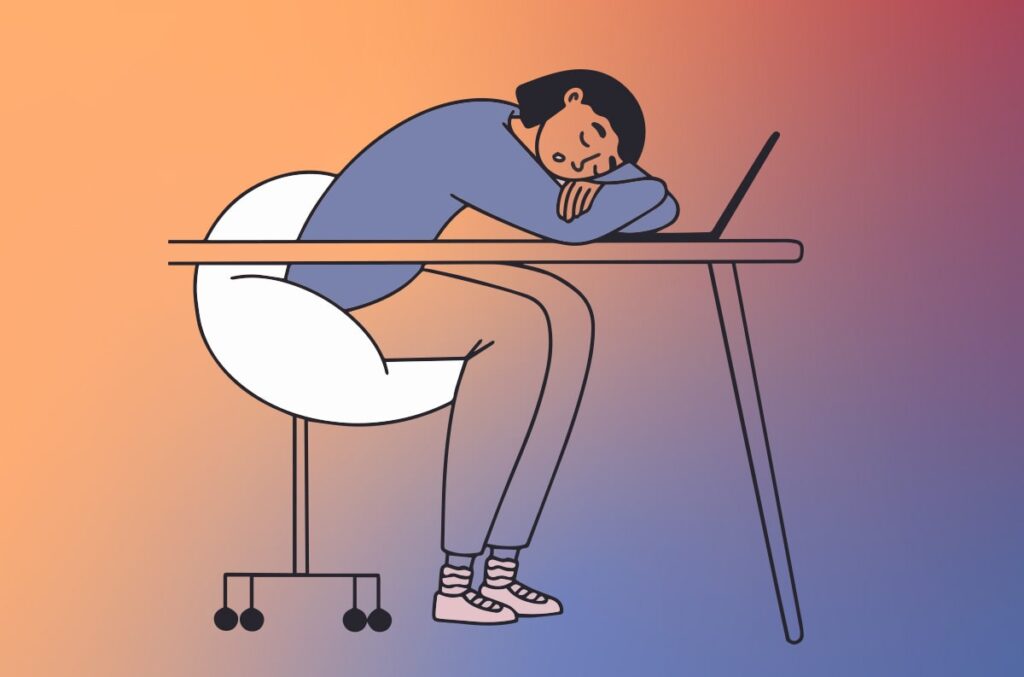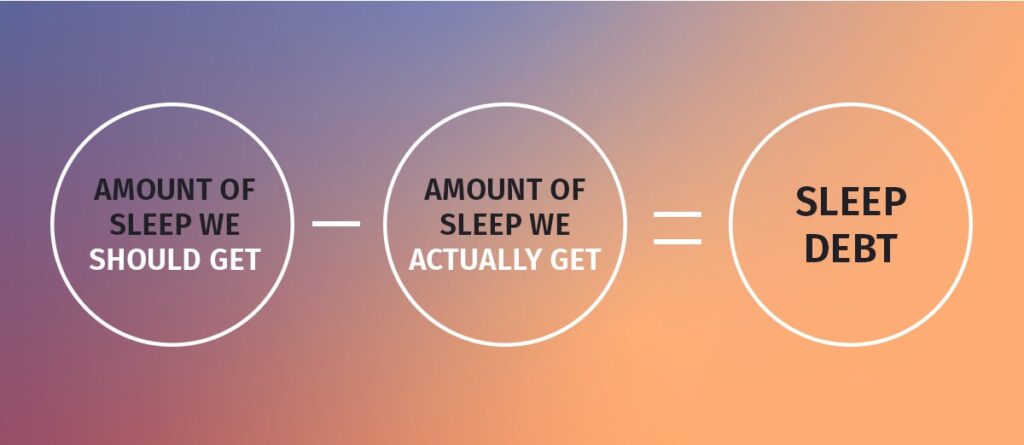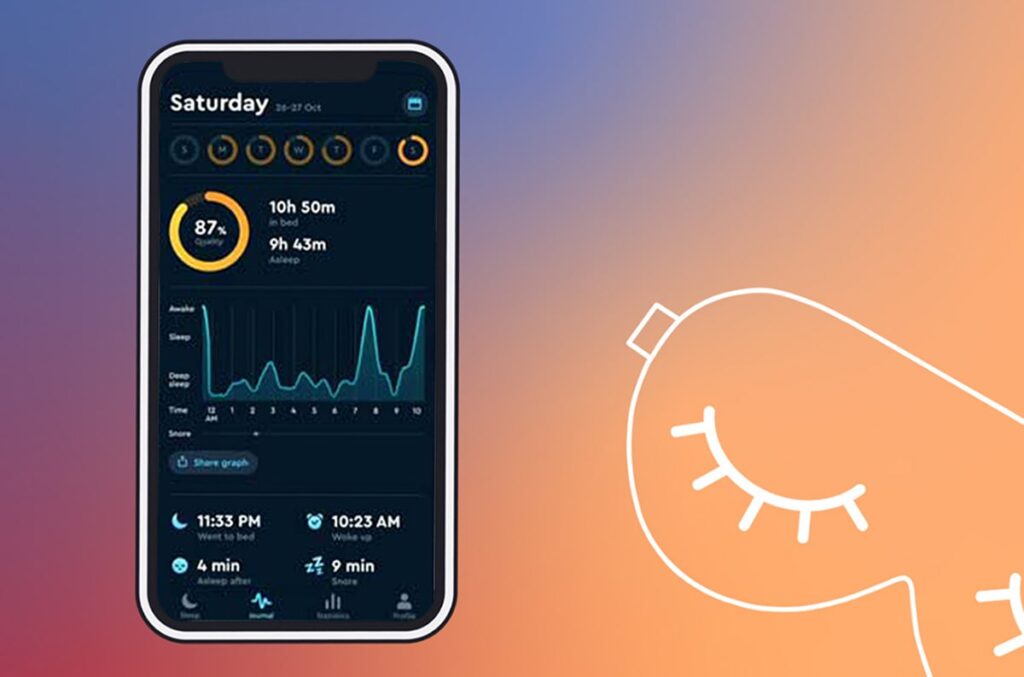We’ve all had to deal with waking up after an awful night’s sleep with a long day ahead. Oftentimes, our busy days don’t allot time for us to nap or go to bed earlier than usual to make up for the night before.
One might think “I’ll just catch up on sleep over the weekend.” But is there such a thing as repaying sleep debt? Keep reading to find out more about sleep debt, what it does to your body, and if it’s truly possible to recover from it.
What is Sleep Debt?
Sleep debt is the amount of sleep you’ve lost compared to the amount of sleep your body needs to feel fully rested.
Sleep debt is a tricky beast, and it’s not quickly made up for. Danielle Kelvas, MD, Chief Medical Advisor at Sleepline says, “Sleep debt accumulates much like credit card debt, plus interest. After residency, for example, it took me almost a year to fully catch up on sleep. For a while, I thought I was chronically ill, but I later learned this can be perfectly normal. I had suffered sleep deprivation for years, meaning it took almost a year to catch up.”
Sleep Deprivation vs Sleep Debt
The phrase “sleep deprived” is commonly used when we’re talking about the lack of rest we have, so what’s the difference between sleep deprivation and sleep debt?
Sleep deprivation is when you don’t get enough sleep. It doesn’t have a specific time requirement, — it’s not as simple as saying after two weeks of terrible sleep, you’re sleep deprived. You can be sleep deprived after just one night of interrupted rest.
Sleep debt differs from sleep deprivation because sleep debt is the difference between the amount of sleep you aren’t getting and the amount you should be getting. Basically, sleep deprivation is the result of sleep debt.
What Sleep Debt Does To You
Sleep debt can affect you within just 17 hours, and chronic sleep debt has its risks. The first being an increased chance of a heart attack. As the total number of hours you go without proper rest goes up, the more dangerous it becomes.
Lack of sleep can lead to negative long term health effects. “Sleep debt contributes to depression, obesity, diabetes, and hypertension,” Dr. Kelvas says, “Numerous studies from the last decade have linked increased rates of heart disease, obesity, and depression among those with poor sleep quality. It seems that poor sleep contributes significantly to the severity and development of other chronic health conditions,” she adds.
“This makes sense because the less sleep we get, the more cortisol and inflammatory molecules are released into the bloodstream. The body is less able to recharge and approaches each day with the tank half empty. When this process of inflammation and hormone dysregulation compounds, it has lasting negative effects on every organ in the body,”says Dr. Kelvas. From impairment in judgment to a suppressed immune system, skipping sleep is difficult on your body.
Sleep Debt Symptoms
Your body will let you know that you need more sleep. Lauri Leadley, Founder & President, and Clinical Sleep Educator at Valley Sleep Center, walked us through the sleep debt symptoms to look out for:
Behavioral Problems Often Caused by Sleep Debt
- Irritability
- Poor judgment
- Attention deficit
- Drowsy driving
- Memory issues
- Emotional stress
- Daytime sleepiness
- Poor risk management
- Depression
- Workplace accidents
Also, people with a high sleep debt are reported to do poorly on intelligence tests, and their beliefs in superstition and magical thinking increase.
Physical Problems Often Caused by Sleep Debt
- Immune system dysfunction
- Worsened vision
- Physical stress
- Advanced aging
- Reduced motor dexterity
- Weight gain/obesity
- Cerebral shrinkage
- Systemic inflammation, which can lead to cardiovascular issues, diabetes, and stroke
How to Calculate Sleep Debt
If you’re curious on how much sleep debt you’ve racked up, we’re here to help you figure it out.
Sleep Debt Calculator
The first step to calculating your sleep debt is identifying the ideal hours of sleep your body needs.
For example, some people need the average eight hours of sleep to feel rested. Others may need 10 hours of sleep to feel ready to wake up. Once you determine the number of hours of sleep that works best for you, calculate the hours of sleep you’ve lost in a full week.
To do this, go through a full week and jot down how many hours you slept each night. Then you’re going to make note of the nights that you didn’t receive your optimal hours of sleep and write those numbers down.
Lastly, you’ll take the number of hours that you lost sleep and add them up for your grand total of sleep debt.
Can You Recover from Sleep Debt?
The million dollar question that everyone wants to know the answer to: is it possible to make up for the hours of sleep you’ve lost? The answer is based on a few different factors, like how long you’ve had sleep debt.
Dr. Wu, MD, Medical Reviewer at Rise Science, says, “There’s longstanding evidence you can get out of short-term sleep debt — the kind you accrue from the occasional late night, travel jet lag, or poor week of sleep. You can make up for this kind of lost sleep by going to bed earlier, sleeping in a bit later, taking well-timed naps, and improving your sleep efficiency (how much time you spend in bed actually asleep) over one or several days (how long it takes depends how much acute sleep debt you have).”
Most of us will use our weekends to catch up on lost sleep. Although the idea of fixing your sleep schedule in general is great for your health, your body may need more time to fully recover.
“Weekend sleep ‘catch up’ is, unfortunately, unrealistic,” Leadley says, “The idea of a ‘sleep bank’ where you can deposit and pull from is misleading. You cannot store sleep for later, and you cannot go without adequate sleep for days and expect not to build sleep debt. Each night you miss out on quality sleep, you are adding to your debt.”
In short, fully catching up on sleep debt in two days is not likely. Fixing your sleep can be a daunting task, and you might want some help. Learn more about the RISE app and how it can tackle sleep debt with you in our complete review.
Do Naps Help with Sleep Debt?
When you’re losing sleep, you might think of ways to make up for it, usually in the form of a nap. Let’s get into the pros and cons of incorporating naps into your routine to combat sleep debt.
Benefits of Naps
- Solves the feeling of being tired or drowsy
- Increases alertness and memory
- Decreases risk of heart disease
Drawbacks of Naps
- Feeling groggy or more tired
- Difficulty sleeping at bedtime
Keep reading about how you can get the most out of your naps in our Ultimate Guide to Naps.
Final Thoughts
Sleep debt and sleep deprivation are two health concerns that can majorly impact your overall health. Be mindful of the sleep debt symptoms so you can begin implementing healthier sleep habits.
Although daytime naps and sleeping in on the weekends is a common approach, remember that repairing the damage from sleep debt is a long game. “The best way to recover from sleep debt is by getting more sleep consistently,” Dr. Kelvas says, “If you can sleep for 14 hours, then let the body regulate your sleep/wake cycles.”
If you’re having trouble getting rest at night and want to avoid sleep debt, check out these resources on what to do when you can’t sleep.
FAQs
Find the answers to your questions below!
Is sleep debt actually a thing?
Yes, sleep debt is the loss of sleep you get each day in comparison to the amount of sleep you should be getting for a full night's rest.
Can you avoid sleep debt?
Yes, you can avoid sleep debt by taking action. Make conscious efforts to improve your sleep hygiene, and follow our tips for bettering your sleep hygiene to get started!
How do I get rid of my sleep debt?
Getting rid of sleep debt is all about routine. If you need help getting started, check out our article on ways you can fix your schedule!
What is the difference between sleep deprivation and sleep debt?
Sleep deprivation is any time you lose sleep, regardless of how many hours you’ve lost. Sleep debt is the total amount of hours of sleep you’ve lost. Sleep debt is the end result of sleep deprivation.
Featured image: GP Studio/Shutterstock



